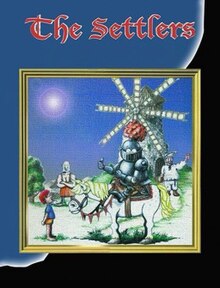| The Settlers | |
|---|---|
 European cover art | |
| Developer(s) | Blue Byte |
| Publisher(s) | |
| Producer(s) | Thomas Hertzler |
| Designer(s) | Volker Wertich |
| Programmer(s) | Volker Wertich |
| Artist(s) | Christoph Werner |
| Composer(s) | Haiko Ruttmann |
| Series | The Settlers |
| Platform(s) | |
| Release | AmigaMS-DOS |
| Genre(s) | City-building, real-time strategy[8][9][10] |
| Mode(s) | Single-player, multiplayer |
The Settlers (German: Die Siedler) is a 1993 city-building video game with real-time strategy elements for Amiga and MS-DOS. Developed and published by Blue Byte Software, the Amiga version was released in Germany in June 1993 and in the United Kingdom in November. The MS-DOS version was ported by Blue Byte and Massive Development. Blue Byte published this version in Europe under its original title in May 1994, but in North America, it was published in December by SSI as Serf City: Life is Feudal. In 2018, the game was re-released for Windows as The Settlers: History Edition. It is the first game in The Settlers series.
The game is set in a medieval milieu, and controlled via a point and click interface, with the primary goal on each map being to build a settlement with a functioning economy, producing sufficient military units so as to conquer rival territories, ultimately gaining control of the entire map. To achieve this end, the player must engage in economic micromanagement, construct buildings, and generate resources. The game can be played in one of two modes; a series of thirty sequential missions against computer controlled opponents of increasing difficulty, or a free-game style mode, in which the player competes in individual games involving either computer-controlled opponents, human opponents, or a combination of both.
Originally envisioned as a standard god game, similar to Populous, the concept of The Settlers was altered by the game's designer and programmer, Volker Wertich, after development had already begun. Wanting to create something unlike other titles available at the time, Wertich decided to focus on creating a game which could simulate a complex economic system, and which would feature gameplay built around a simulation of real-world supply and demand. However, due to the complexities of writing a codebase which understood and could realistically duplicate such a system, as well as ensuring the computer could handle military and economic matters simultaneously, the game required over two years of development. Wertich worked on the programming for a year, writing 70,000 lines of code, before any work began on the graphics.
The game received positive reviews and was first released on the Amiga and one year later ported to DOS due to its popularity on the Amiga. Critics especially praised the complexity of the economic system and the interrelatedness of the various buildings, as well as the graphics and sound effects. While some saw it as a god game, comparing it favourably to Populous, others saw it as a city-building game, comparing it favourably to SimCity. Others, however, felt it defined a new genre altogether by blending elements of god games and city-building games. It is often cited as one of the best Amiga games ever made. It was also a commercial success, selling over 400,000 units worldwide across both systems, considerably more than Blue Byte had anticipated. It went on to form the basis for The Settlers series, one of Blue Byte's most successful franchises.
- ^ Dillon, Tony (December 1993). "The Settlers Review". CU Amiga. No. 46. p. 17 (Christmas Supplement). Retrieved May 9, 2017.
- ^ Kolokythas, Panagiotis (June 27, 2003). "Die Siedler feiern 10-jähriges Jubiläum". PCWelt (in German). Archived from the original on July 6, 2017. Retrieved May 8, 2017.
- ^ "Ubi Soft feiert 10 Jahre Die Siedler". GamesMarkt (in German). June 27, 2003. Archived from the original on July 6, 2017. Retrieved May 8, 2017.
- ^ "Eyewitness". PC Gamer (UK). No. 3. February 1994. p. 26.
- ^ "Messebericht: Computer '93: Deutsche Hersteller auf dem Vormarsch". PC Games (in German). No. 16. January 1994. p. 109. Retrieved May 8, 2017.
- ^ "Serf City: Life is Feudal (PC)". IGN. Archived from the original on April 23, 2018. Retrieved April 23, 2018.
- ^ Wilke, Thomas (June 10, 2008). "Die Siedler: Kleine Männlein ganz groß - Eine große Serie im Rückblick (Siedler 1 bis Siedler 4)". PC Games (in German). Archived from the original on November 14, 2021. Retrieved March 4, 2022.
- ^ Whitehead, Dan (October 18, 2007). "The Settlers: Rise of an Empire Review: Fall of a Franchise". Eurogamer. Archived from the original on May 4, 2018. Retrieved May 4, 2018.
- ^ Johnson, Neilie (April 6, 2010). "The Settlers 7: Paths to a Kingdom Review". IGN. Archived from the original on May 3, 2018. Retrieved May 3, 2018.
- ^ Moss, Richard (November 10, 2015). "From Sim City to, well, Sim City: The history of city-building games". Ars Technica. Archived from the original on May 3, 2018. Retrieved May 3, 2018.